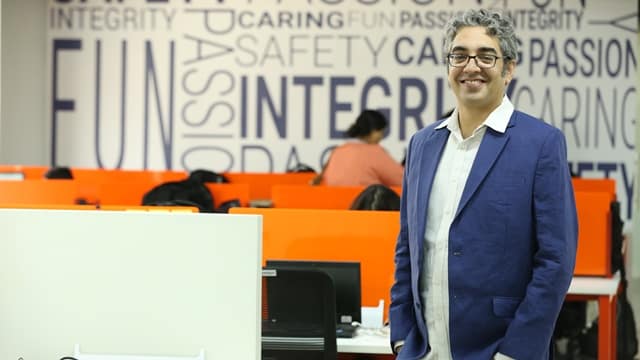Education
Education sector has adopted technology but digital disparity remains: Ruchir Arora
Countries are now adopting a more technology blended learning approach for a better learning experience, but the process remains slow due to digital disparity, especially for a country like India making education out of reach for many students.
Ruchir Arora, Co-Founder and CEO, CollegeDekho, in an interaction with MyBigPlunge discusses challenges experienced by the education sector, especially higher education, in these testing times:
What kind of challenges has the education ecosystem been thrown at by the ongoing COVID-19 pandemic? Please elaborate.
Covid-19 pandemic has challenged the overall education composition of not just India but the entire world. Countries are now adopting a more technology blended learning approach for a better learning experience, but the process remains slow due to digital disparity, especially for a country like India making education out of reach for many students. Additionally, with vernacular education pervasive in Tier 2 and Tier 3 metropolises, the disparity seems to be growing. Apart from students the sudden shift due to COVID-19 has not been easy on teachers as well. With traditional teaching suddenly being substituted by online classes, it has made the teacher’s job tougher. In addition to formulating course material, they are now required to keep pace with the emerging technology tools and adapt to them.
Each year, approximately 10 million students complete their senior secondary across country. The impractical cut-offs and high competition make it a tough call for students to obtain admissions in the highly acclaimed government-backed institutions like Delhi University, Mumbai University, IITs and other top universities that have a very less number of seats on offer. As a result of that, only the meritorious students are able to take seats in the courses of their preferences, while the majority is left to fend for themselves.
So, a lot of students around India look at private universities where they can find affordable education connected with highly skilled faculty but may have to compromise on the infrastructural facilities and limited means of learning accessible to them. Due to COVID-19 the format of recruiting student has gone online, which the higher education institutions had to painstakingly adopt to facilitate student enrolment process. If we talk about the students specifically, with limited access to trusted resources and emergence of a wide career options, it is but natural to be confused on the preferred choice for college and course. Given the lack of any central guidance system in India, the new-age ed-tech platforms like CollegeDekho are making use of this (in) opportunity to help students make informed decisions in their higher education journey.
How did CollegeDekho overcome the challenges?
Also Read: Disruptions in global supply chains continue to hit retailers and consumers
CollegeDekho, since its inception, has counseled students to help them pick the right college basis their academic background, interest & spending capacity. CollegeDekho aims to bridge the gap using technology and its product offerings to make informed decision on colleges and courses. During COVID-19, we utilized technology to connect students with experienced industry counselors, so that they could make an informed decision.
India is a developing country and lakhs of households across India cannot afford more than one mobile device. And majority of the population doesn’t even own a tablet, laptop or a PC. As such, there is now a great big education divide. What are your views on this?
It is true that students in rural areas do not have access to even internet, let alone owning smartphones, tablets or laptops. This is where government schemes and NGO’s and philanthropists have come to the fore to help out. However, with red tapeism & bureaucracy rampant, there is no way of telling how many have actually reached the student. Having said that, some colleges in remote areas, have given out notes to students so that their learning does not stop. How much that has contributed to the student’s learning process, is a question in itself. But as more and more people get vaccinated, we hope that educational institutes can at least conduct 3-4 days of classes in a week and the students are able to make up for lost time.
How can the industry stakeholders, including the government, overcome this?
The National Education Policy (NEP) is set to bring about a total change in the education system of India in coming years. The introduction of the Academic Bank of Credit (ABC), which was launched as part of completion of one-year of the National Education Policy (NEP) 2020. The ABC will help enable students to option of multiple entries and exits alternatives in terms of both undergraduate and postgraduate level of education. ABC primarily has been set up by UGC. Additionally, MHRD also will create a special unit which will specialize in developing infrastructure and digital content to market e-education. Multiple measures also will be taken to introduce more online courses and digital repositories, recognize MOOCs on the idea of credits so as to make sure quality of imparting knowledge is maintained. With foreign universities also willing to make centres in the country and intake India students for different courses offered at their university is also considered important so as to give equal opportunities to students and the scholarship part also makes it easier for a student from average household to get admission to these universities.
Both government and private colleges and universities are constantly expanding their portfolios and brand image by signing up MoUs with industries as well as other leading educational organizations in India as well as overseas to nurture relations and network alliances. Students are encouraged to enroll in exchange programs to make them globally aware and more employable and the access to mobile phones and tablets are also being made through these MoUs. This will help overcome the shortcoming we see in the education system and will enable students to express themselves and get a job of their choice.
What more (crucial) needs to be done?
We believe education has to be made more accessible. Government should devise ways to provide free education and create centers where students can visit and collect relevant data/course (chapter, syllabus) information easily. Alternative methods of learning needs to be implemented; and tie-ups or collaborations with nearby colleges through CSR activities to provide an ecosystem to educate the students.
The higher education sector is also suffering. How can students and the industry get through this?
With major changes expected in the next few years, we are yet to see how the mega plan of empowering students with higher education will pan out, but one thing is for sure that if India is able to pull off and implement the NEP policies with getting twisted in the web of bureaucracy, India can surely stand tall with the USA, Australia, or Canada etc. with its value of education and increasing employability for students.
The use of Artificial Intelligence and other upcoming technologies can also help in overcoming the current challenges, we can use hybrid models in terms of being physically attending the classes and the governments are also helping institutions in shifting gears to a fresh and easy to use form of student assessment that encompasses a more student-specific feedback, evaluation, and grading tools, proctored online examinations, etc. Things might take time to get back to normal but new ways of education are definitely introduced which can be considered as an option in the coming years as the world is going digital in every aspect it is important to make education digital slowly and find solutions to bridge the gaps that we find are there in the system and also find solutions to overcome them.
Should the government play more of an active role and implement a policy which can help the sector steer away from the pandemic and towards the betterment of the students and the sector as a whole?
As a nation we are used to creating innovative solutions to toughest of the scenarios resulting from our resilience and grit. The government at present is actively exploring ways to address the current situation and all the stakeholders- individually or collectively, are contributing to it. New Education Policy (NEP) is one such initiative which is aimed at transforming the sector.
CollegeDekho, one of India’s fastest growing education services provider that is connecting students to colleges and universities from across geographies with latest information on admissions, entrance tests, infrastructure, courses and careers. The Ed Tech startup aims at institutionalizing students counseling in India and thus far has counseled over four million students in just six years of its inception.











































Pingback: Teachmint has collaborated with Dhaka-based edtech Shikho.
Pingback: Wat-a-Burger is planning to accelerate its expansion in South India regions